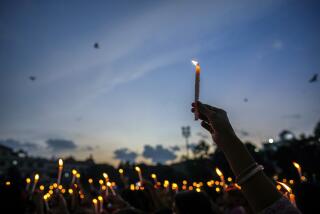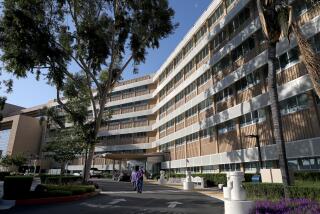In South Africa, strike reportedly erupts into chaos
- Share via
Reporting from Johannesburg, South Africa — Public healthcare patients went without treatment. Schools could not operate. Police fired rubber bullets and water cannons at demonstrators trying to block roads.
South Africa’s national civil service strike disrupted lives throughout the country Thursday for a second day as a million workers, including medical personnel, teachers and clerks, refused to allow routine services while they demanded higher wages.
Although a union representative denied that protesters kept patients out of healthcare facilities, some hospital workers described frightening experiences.
At one large public hospital in Johannesburg, a young student nurse said she hid behind a curtain when a crowd of protesters took over the facility. She was afraid to move, so she sent Twitter messages, pouring out her fear to an online audience of strangers that grew larger by the second.
The demonstrators “broke down the main gate into the hospital,” she said later in an interview. “They got into the hospital and made their way through the wards. I thought if they realized I was a nurse, I’d be attacked.
“Staff were hiding in the bathrooms. I sat there and I froze. All I kept thinking was, ‘I’ve got to get out of here,’ ” said the student, who sent her Twitter messages under the name AndyWandy and refused to give her name, fearing reprisals.
After several hours, the few remaining nurses told students it was no longer safe for them to stay at the hospital.
The student who sent the tweets said she put on a stethoscope, hoping to pass as a doctor in case she was stopped, and left the hospital via a back entrance, avoiding the protesters.
“I am just shocked it came to such violence,” she said. “It was so unnecessary.”
Public sector unions are demanding an 8.6% pay raise and a $138 monthly housing allowance. But the government contends that it won’t improve its offer of a 7% wage increase and $97 housing allowance, stoking fear that the strike may drag on for weeks.
A Gauteng provincial government health official, Qedani Mahlangu, said two premature babies were found dead Wednesday night. The infants had been among a group of 23 in one neonatal ward being cared for only by security guards because nurses had walked off the job.
“The babies were cold and had not eaten for the whole day,” Mahlangu told the Star newspaper. The babies in the neonatal ward at Natalspruit Hospital in Alrode, a suburb southeast of Johannesburg, were later moved to private hospitals.
Police fired tear gas and rubber bullets at protesters blocking hospital entrances, amid reports that patients and ambulances had been prevented from entering.
South Africa’s renegotiation of labor contracts usually begins with a public sector wage campaign and the resulting pay increase feeds private sector wage demands and fuels inflation. The process can fray relations between the ruling African National Congress and its union allies.
Government spokesman Themba Maseko said after a Cabinet meeting Thursday that the government could not afford the union demand, which would cost nearly $700 million and was well above the 4.5% inflation rate.
Dumisani Dakile, a spokesman for the Council of South African Trade Unions, denied that protesters had intimidated people or prevented anyone from entering hospitals. He accused police of overreacting to peaceful picketing.
A day earlier, teachers union officials threatened to retaliate against any government school that remained open.
“South Africa will never be the same after today,” said Moses Senya, an official of the South African Democratic Teachers Union, the Star reported. “We need to settle scores, cause pain and leave no stone unturned. Everyone must feel the cause.”
Unions argue that if South Africa could afford to host the recent soccer World Cup, it should pay its workers better.
Last year the government approved a pay increase of more than 11% to public sector workers, prompting criticism that it was neglecting the poorest South Africans, such as welfare beneficiaries and the unemployed, in favor of its union allies.
But Maseko said Thursday that the government had to balance the interests of the unemployed and those who had jobs.
“It’s a choice between improving the wages of state employees and continuing to address the service delivery needs of poor communities and the unemployed,” Maseko said.
robyn.dixon@latimes.com
More to Read
Sign up for Essential California
The most important California stories and recommendations in your inbox every morning.
You may occasionally receive promotional content from the Los Angeles Times.










